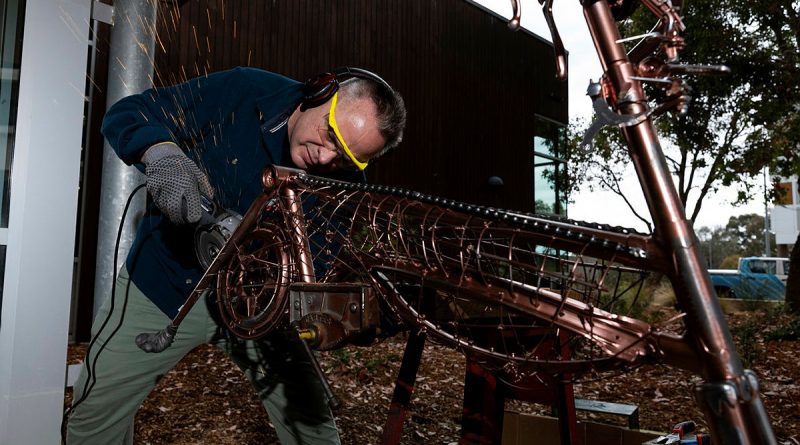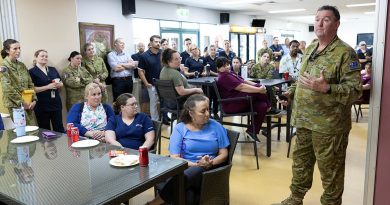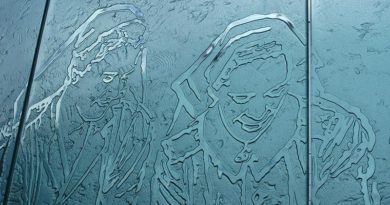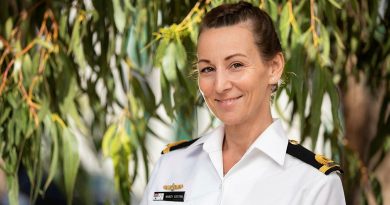Art for health’s sake

For Lieutenant Commander Will Singer, serving as the Deputy Director of Navy Communications and Media often involved juggling multiple high-pressure roles.
CAPTION: Lieutenant Commander Will Singer works on his repurposed bicycle sculpture as part of the ADF ARRTS program at the University of Canberra’s Inspire Centre. Story by Flight Lieutenant Thomas McCoy. Photo by Leading Aircraftwoman Emma Schwenke.
At 6 one morning, in August last year, while doing solitary planning work on a whiteboard, Lieutenant Commander Singer collapsed, waking up five minutes later, the red marker still in his hand.
“That’s when I realised I’d been pushing myself way beyond my limits,” Lieutenant Commander Singer said.
“I had kept telling myself that I had resilience and could manage it, but this incident confirmed that my mental health, physical health and emotional health had all taken a step back and that it had come to a point where I had drastically overworked myself.”
After receiving some medical attention, Lieutenant Commander Singer was encouraged to join the ADF Arts for Recovery, Resilience, Teamwork and Skills (ARRTS) program by his supervisor.
The four-week program involves experienced mentors teaching music, writing and visual arts techniques to help participants discover new outlets and enhance their wellbeing.
“I was delighted to join the program, having watched a staff member complete it a few years earlier and return with beautiful artworks and a changed outlook, and I hoped I could achieve something similar while still having my laptop with me to complete my regular work,” Lieutenant Commander Singer said.
When he was asked to keep his laptop closed for the duration of the program, Lieutenant Commander Singer focused on learning about visual arts.
“I’m glad they asked me to put the laptop away as it meant I was able to fully unleash my creative energy into an entirely new area,” he said.
Lieutenant Commander Singer’s major artwork was prompted by a group excursion to the tip, where he found a vintage bicycle.
“When I saw it, I was thinking about how I could transform something so old and dilapidated into something resilient and powerful, with my work on the bike modelling my own journey,” he said.
“I called it the Bent Spoke Bull, and my mission was to minimise having to obtain extra items so the only things I got from outside the bicycle were two eye sockets, made from skateboard wheels, and wire to set up the torso of the bull.”
Because Lieutenant Commander Singer did not have a welding machine he used screws and angle grinding to put it all together.
His second artwork, also largely made from bicycle parts, was a militia-like mercenary wearing a bandana, mounted on a jarrah slab with a firearm and bullets.
Wife Cindy and daughter Olivia, who flew from Albany, WA, to see Lieutenant Commander Singer’s creations, were impressed by the transformations he had achieved in such a short time.
Now back home with his family and serving in a reservist capacity, Lieutenant Commander Singer is continuing his artistic journey and has set up a workshop in a 20-foot shipping container.
“I’m doing this because what it does for me mentally is far more satisfying than a 10 kilometre run or sitting and meditating; I just enjoy the serenity of myself and choosing the tools and bolts to create something amazing,” he said.
“I’ve also met wonderful people on this program, and I’d recommend it, not just to people who have gone through extreme measures in their mental health, but also to those who’ve had a rough time at work and may be feeling drained, downcast and unaccomplished.”
The next ADF ARRTS program will be held in Canberra from May 5-31. Applications can be submitted until April 1.
For more information, email adf.arrts@defence.gov.au or visit www.defence.gov.au/adf-members-families/health-well-being/adf-arrts
.
.

.
.





